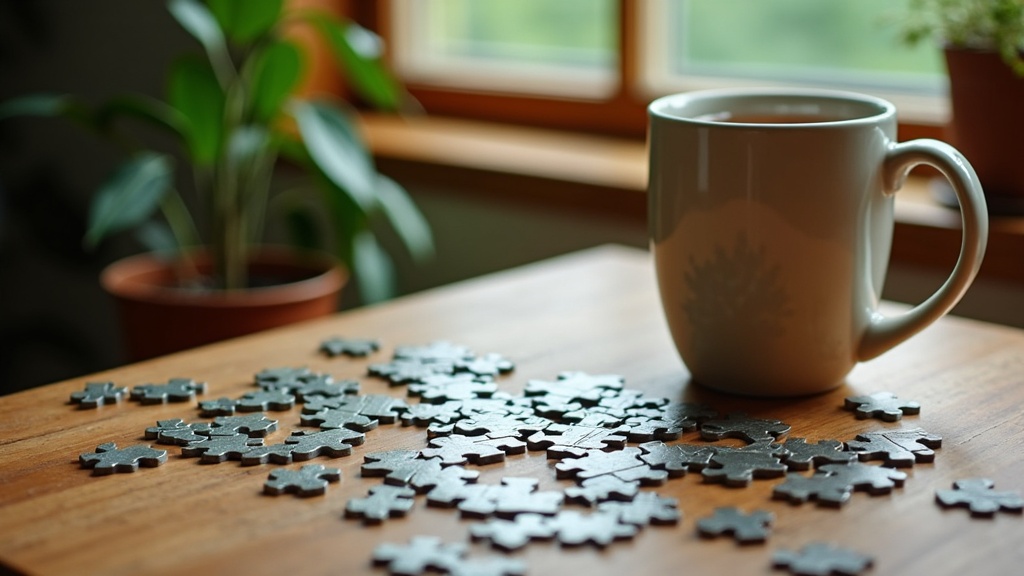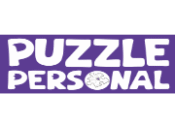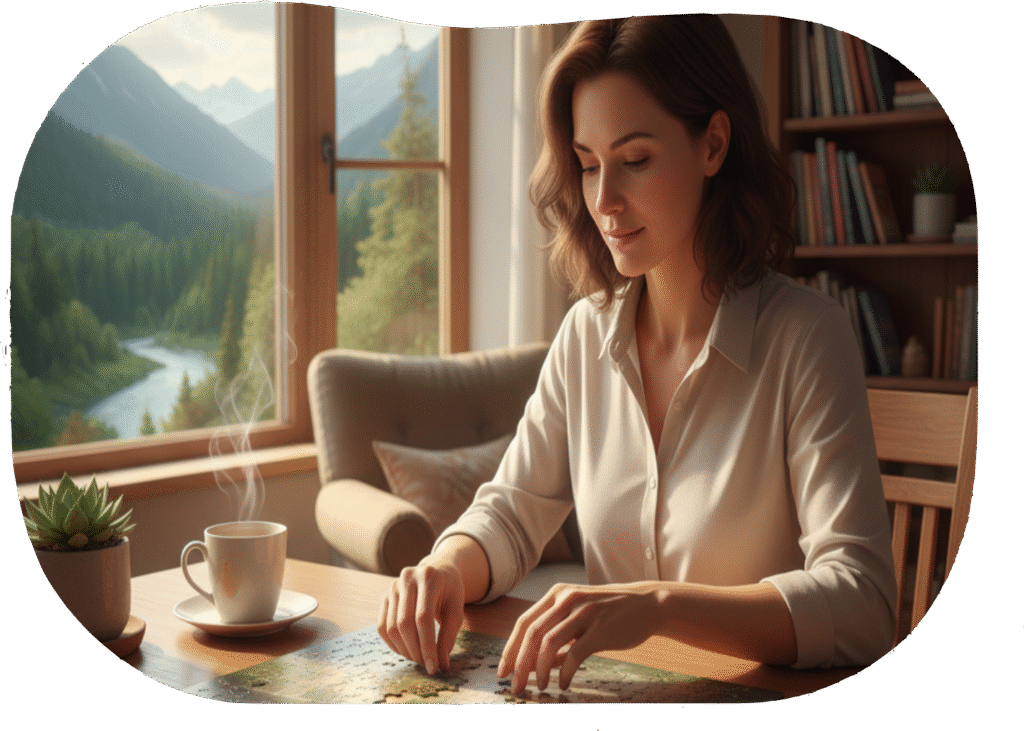Puzzle fatigue happens more often than most people expect, especially for anyone who enjoys long puzzle sessions, whether that’s jigsaw, crosswords, or even brain teasers. Spending hours focusing on a complex puzzle can leave the mind wiped out, fingers stiff, and attention wandering all over the place. Keeping puzzle time fun and rewarding comes down to knowing how to prevent puzzle fatigue before it sneaks in and spoils the fun.
This article covers practical breaks, stretches, and focus tricks that anyone can use to keep puzzling sessions sharp and satisfying for the long haul.

Why Puzzle Fatigue Happens
Puzzle fatigue isn’t just about feeling bored or stuck. It’s a real mix of mental tiredness, body tension, and eye strain. Puzzles demand constant problem-solving from the brain, pulling intense focus for long stretches.
Over time, this concentration can sap energy, making it tough to spot even the most obvious answers. It’s a lot like reading for hours and getting eye fatigue or holding a pen too long, which can lead to hand cramps and tension.
Spending time scanning pieces, looking for patterns, or jotting down crossword clues all require repetitive, small movements and steady concentration. Skipping breaks or ignoring signs that it’s time to move around can mean that tension creeps in without notice. Knowing how puzzle fatigue builds up is an important first step in stopping it from taking hold.
Recognizing Early Signs of Fatigue
Spotting fatigue before it gets bad helps puzzlers step back and take a breather before things get frustrating. Here are some early signals:
- Wandering Focus: Eyes drift off the puzzle or it gets hard to stay on track.
- Physical Tension: Shoulders begin to rise, the back starts to ache, and fingers feel stiff.
- Slower Progress: It takes more time than usual to find matching pieces or the right answer.
- More Mistakes: Accidentally placing pieces incorrectly, writing the wrong word, or missing clues.
Even just one or two of these are a nudge to pause the session. Taking a break, even if it’s short, can do wonders to reset energy and motivation.
Break Strategies for Puzzle Sessions
Building in regular breaks helps keep energy and creativity up, instead of powering through and losing momentum. Here’s how to make breaks part of your puzzle routine:
- Scheduled Breaks: Set an alarm for every 30-45 minutes and walk away from the puzzle for 5-10 minutes. These little pauses keep you refreshed and ready for more.
- Microbreaks: Every 10-15 minutes, lift your eyes from the puzzle, gaze around the room, take a deep breath, and let your hands rest. Even just a brief microbreak helps prevent tension build-up.
- Fresh Air: Open a window for a breeze or step outside for a change of scenery. Fresh air can spark renewed focus and brighten your mood.
- Body Awareness: Check in with how your body feels. If your back, neck, or hands are tense, take a moment right then to stretch.
People who get into the habit of stretching and taking quick breaks early on find their puzzling sessions are much more enjoyable and productive.
The Right Stretches for Puzzle Solvers
Long puzzle time can sneak tension into your shoulders, neck, wrists, and eyes. These easy stretches target the most stressed areas:
- Neck Rolls: Gently roll your head in circles. This helps your neck relax, especially after long periods focusing down.
- Shoulder Shrugs: Lift your shoulders up to your ears and then let them drop. Repeat a few times for instant relief.
- Wrist Circles: Stretch your arms out and move your wrists in slow circles, both ways.
- Finger Flexes: Spread your fingers wide, then make a fist. Do this several times to keep your hands supple.
- Seated Twist: While sitting, twist gently at your waist to look over each shoulder for a gentle back and spine stretch.
- Eye Breaks: Blink slowly or close your eyes for ten seconds. Then, focus on something far away like a tree or painting.
Pausing for even a minute to do these stretches makes a real difference when you hop back into your puzzle adventure.
Focus Techniques for Staying Sharp
Staying on your mental game is just as important as keeping your body limber. Try these focus tricks to stay sharp and avoid brain drain during a puzzling session:
- Break the Puzzle Up: Instead of going at the whole thing at once, do sections; gather the edge pieces, work on color groups, or tackle corners as their own project.
- Switch Up The Type: Mix a jigsaw with word puzzles, riddles, or logic problems. Changing the kind of thinking resets your brain and makes puzzling less monotonous.
- Mindful Breathing: Close your eyes and take a long, slow breath in and out a couple times. This can help clear away frustration and dial in your focus.
- Visual Reset: Every now and then, look across the room or out a window. Relaxing your eyes stops eye strain from building up and sharpens focus for when you look back.
Mixing these habits into your routine helps break up any monotony and gives your mind a fun “refresh” button.
Common Challenges and Ways to Overcome Them
Every puzzler faces their own hurdles. Here’s a rundown of popular stumbling blocks and how to outsmart them:
- Sitting Too Long: Get up and move every once in a while. You could use a puzzle mat or board that lets you carry things to a new spot for a change of scene.
- Hand Soreness: Alternate using different hands, hold pieces gently, and stretch fingers in between. Lightweight puzzle pieces or ergonomic grips can really help too.
- Distraction: Experiment with sound. Some people like soft music or gentle background noise, while others focus best in silence. Try out different environments to find your groove.
- Overwhelmed by Complexity: Don’t be afraid to jump to an easier puzzle or just take a longer break. Returning with fresh eyes often reveals solutions you missed before.
- Tension From Hunching: Keep your workspace at a comfy height, sit on a supportive chair, and check your posture regularly. Even small changes can ease up physical strain.
Puzzle Setup: Creating a Comfortable Work Area
The spot you pick for puzzling matters a lot.
- Good lighting stops squinting.
- A cozy chair makes sessions longer.
- A wide table with a smooth surface means you won’t be knocking pieces off.
- Some people use portable mats so that, if you need to move rooms or store the puzzle, it’s simple.
Stashing snacks, water, or a warm drink nearby gives you little comforts and fuel while puzzling, so there’s no need to rush through just to take care of yourself.
Real-Life Examples: How Breaks and Stretches Help
Lots of puzzlers have mixed up their routines and found that small changes mean longer, happier puzzle sessions. For example, a local puzzle club kicks off each meeting with a quick stretch, then sets a 40-minute timer. When the timer rings, everyone stands, grabs some water, and does a shoulder roll before diving back in. People say they stick with puzzling longer and finish with fewer errors.
Another crossword group has a “look away and walk” rule: after every ten clues solved, they stand up and look outside or stroll around for a minute. Members say they feel less cranky and stay more creative, especially during tough puzzles that would normally sap their energy.
Frequently Asked Questions
Question: How long should puzzle breaks be?
Answer: Short breaks, about 5-10 minutes every 30 to 45 minutes, work best for keeping energy up and avoiding fatigue. Even standing up for just a minute or so helps keep tension from sticking around.
Question: What if someone feels silly stretching in public places?
Answer: You can keep it low-key with shoulder shrugs, rolling your wrists, or flexing your fingers quietly. Just standing and walking for a bit is enough to recharge without attracting attention.
Question: Are there specific foods or drinks that help reduce fatigue?
Answer: Water keeps you hydrated and alert. Light, healthy snacks, like fruit, nuts, or yogurt help keep your brain in top gear. Try to skip heavy or super sugary foods, which can lead to sluggishness and crashes later on.
Wrapping Up Healthy Puzzle Habits
Balancing puzzling with body and mind care turns ordinary sessions into rewarding ones. Building in regular breaks, simple stretches, and smart focus habits will help keep puzzle fatigue out of your adventure.
The key is to find what feels best for you. Try these tips, adjust as you go, and remember: the real joy of puzzling comes from playing the long game, where fun and comfort go hand in hand year after year.
Let us know how you prevent puzzle fatigue..


